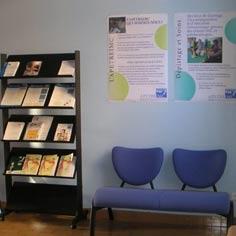
Social and Employment
Place
France
Sponsor
Martine Barthes
Grant(s)
20,000 euro to the Selection Committee at 2006/10/03
Project leader
“A well-constructed project of public benefit that brings together the input of both parents and the medical sector. The association’s team members include several volunteers who are incredibly dedicated parents of children with cerebral palsy.”
Martine Barthes
Three of one thousand babies are born with cerebral palsy* (CP) resulting from non-evolutionary cerebral lesions. An irreversible trauma with a great many causes (in utero or at birth), CP may be due to an early cerebrovascular accident, insufficient nutrition of the brain (especially in the case of very early premature births), or a lack of oxygen during birthing.
While the seriousness of the consequences varies from one person to another, each child can make progress (and become integrated into today’s living conditions), providing they have everyday support. For this, the families need access to appropriate care. To overcome the shortfalls they come up against in this area, parents of CP children created an association 20 years ago.
The Association pour l’éducation thérapeutique et la réadaptation des enfants IMC (ApetreIMC) (Association for the Therapeutic Education and Rehabilitation of Children Suffering from Cerebral Palsy) opened its first minding center, Trotte-Lapins, in Paris’s 15th Arrondissement, in 1983; a second, Ramdam, in 1995, in the 17th Arrondissement; then a third, Le Chalet, in the 10th Arrondissement, in 2000. These three centers are open to able-bodied children and those suffering from CP, and their parents are invited to become involved in the work of the educational team. The association has also opened, in Seine-et-Marne, a center for 45 young CP adults, which also supports research programs.
One step further
However, a child with cerebral palsy cannot satisfactorily attend regular schooling without continuing to benefit from specific aid. When they reach school age, ApetreIMC continues to provide support through its Therapeutic Support Service (SAT). Today, it wants to take this action a step further.
It therefore plans to convert the SAT attached to its Trotte-Lapins Center into a Sessad (Specialist Education and Home Care Service) to provide supervision for thirty young people aged between 4 and 20 years. Sessads are medical-social services that operate either autonomously or as part of a specialist education facility. They are comprised of people working in a variety of disciplines (psychologists, doctors, physiotherapists, medical-teaching aids…), who can work in the child or adolescent’s home, at school, a minding center, or its own premises, etc. This new development will help extend the association’s support structure by providing it with permanent premises and resources. In this specific case, the Sessad is resident at the Saint-Jean-de-Dieu center for handicapped persons. Located in Paris’s 15th Arrondissement, it is the only structure of this type in west Paris.
* Source: Figures published by the French Ministry of Health, Family and the Disabled, April 2003.

